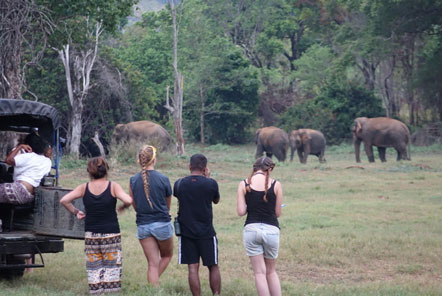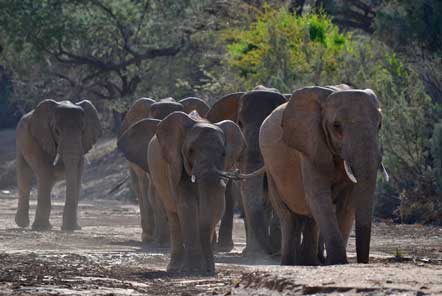Should I ride an elephant?
Volunteering & Travel Advice / 13 January 2018
If you love elephants, it’s highly likely that riding one features on your bucket list and fair enough, sitting atop the world's largest terrestrial mammal sounds like the experience of a lifetime! Before I knew better I rode an elephant. I loved the experience and was completely unaware of the larger impacts of something that I thought was a way to get up close with an animal I love. Unfortunately though what I thought was a harmless, even positive, interaction is a far more complex issue.
At Pod Volunteer, we understand that it can sometimes be difficult to know what is right or wrong in animal care and conservation. We have written this article to help tourists and volunteers make an informed decision about riding elephants. We also share some elephant friendly ways of incorporating them into your travels!
A complex issue
Elephant riding has become a popular tourist activity, particularly in Asian countries such as Thailand, Cambodia and Nepal. It has increased as a result of this demand at the same time as the reduction of elephants being used in the logging industry, leaving elephants and their mahouts (elephant keepers) without a job. In order to maintain a living, mahouts are forced to find alternatives ways of utilising their elephants for money. This source of income often comes from using the elephants for trekking, rides and entertainment.
Sadly the Asian elephant is now an endangered species. There are currently as few as 38,000 to 50,000 Asian elephants globally, and they are listed as "endangered" on the IUCN Red List.
Tourists can have a major impact on protecting the remaining few and in recent years more and more travellers and tour operators have started to question the ethics of riding elephants and the impact it can have.
Why is elephant riding bad?
1. Elephants can’t be truly domesticated
People often think that an elephant in captivity is domesticated, however this simply isn’t possible. Unlike cats, dog and horses which have been bred over many generations to follow the command of humans, this isn’t the case with elephants. Elephants are social animals and naturally live in matriarchal herds in which they forage, play, bathe, and travel many miles a day. All elephants have these natural instincts and as a result will suffer if they live in captivity, especially if isolated from other elephants.
2. Training may use cruel techniques
Elephants are wild animals and so they are not easily trained. Even if an elephant is born in captivity, it is still wild and needs to be “broken” in order to follow the command of its mahout. Although less common now, the traditional training process known as ‘phajaan’, controls animals with sharp hooks, inflicts starvation and torture upon young calves to break their wild spirits.
3. The elephants may have been captured from the wild
It’s estimated that as many as 75% of captive elephants have been taken from the wild when they are very young. Their mothers are often killed too, as they become aggressive in an attempt to save and protect their young.
4. It can injure the elephant
Despite their size elephants are not designed for carrying people on their back which can often lead to permanent spinal injuries. The chair or Howdah attached to their backs also rubs on their back, causing blisters that can get infected.
5. It’s dangerous!
When they are full size, adult elephants can reach 4 metres and up to 7 tons. As wild animals they have an unpredictable nature and it is unsafe to ride them. A tragic example was the British tourists killed on an elephant ride in 2016 on the island of Koh Samui in Thailand.
What can we do?
If we are willing to pay to ride an elephant, then local communities are economically incentivised to make that activity available to us. This presents a fantastic opportunity too – as it means we also have the power in our own hands to stop it!
And the good news is that this doesn’t mean that we can’t interact with elephants whilst we’re on holiday! Not all interactions are negative and it is possible to engage with elephants in a positive way.
As an alternative to elephant riding there are some well-run facilities with elephant viewing, bathing and feeding activities but it’s important to consider the level of interaction with the elephants and check where your money goes, so you know what the motivation for the activity is.

If possible it’s best to see elephants in the wild in their natural habitat and there are also some excellent sanctuaries and rescue facilities playing a vital role in conserving elephants.
If you are thinking about volunteering, do your research carefully to make sure the project is genuine, ethical and beneficial.
Finally, we encourage you to spread the word about the negative effects of riding elephants. Even the biggest elephant lovers are often not aware of the harm they are causing so just by sharing information we can change minds and make a real difference.
What projects does Pod Volunteer offer for helping elephants?
We have a small number of carefully selected projects working with elephants, ensuring that they follow our animal care policy as well ABTA’s animal Welfare guidelines.
Elephant Conservation in Cambodia – Observe gentle giants in their natural forest habitat and assist the team in conducting elephant health checks.
Elephant Care in Thailand – Care for retired elephants in a tropical wildlife sanctuary, rescued from logging and tourism industries.
Desert Elephant Conservation in Namibia - Protect, track and research elephant herds in the beautiful Southern African desert.

References
- Tourism Concern - https://www.tourismconcern.org.uk/should-you-ride-an-elephant/
- Responsible Travel - https://www.responsibletravel.com/holidays/elephant-conservation/travel-guide
- PETA - https://www.peta.org/blog/9-jumbo-reasons-to-avoid-elephant-rides/
- ABTA - https://abta.com/working-with-the-industry/animal-welfare












